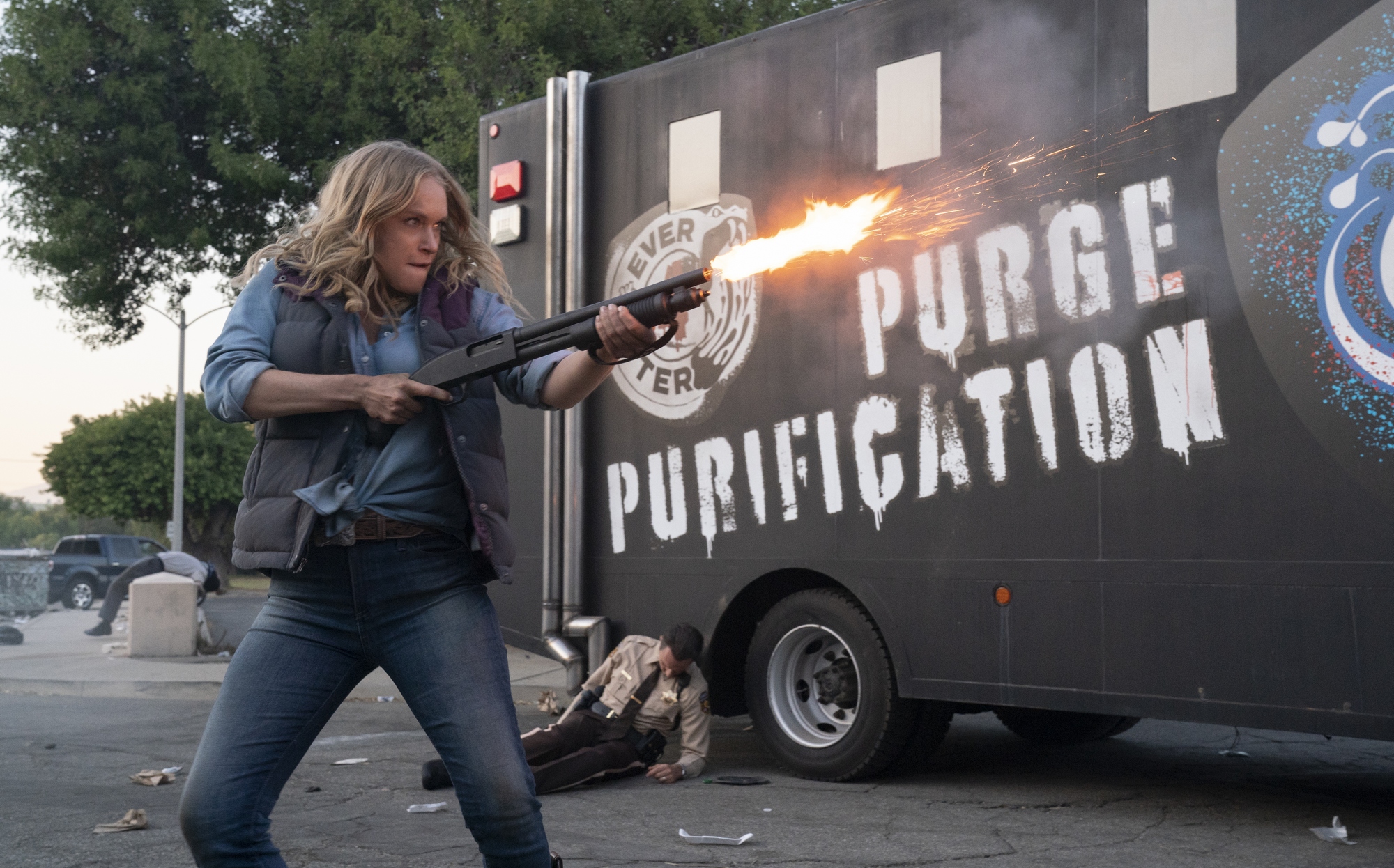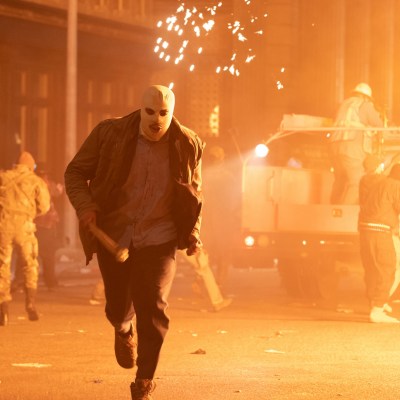In The Forever Purge, the fifth movie in the dystopian action-horror franchise which began in 2013 with writer-director James DeMonaco’s The Purge, the totalitarian regime known as the New Founding Fathers of America (NFFA) are back in power after having been booted out of office in 2016’s The Purge: Election Year. Right off the bat, they’ve reinstated Purge Night, the annual event in which all crime — up to and including murder — is legal for 12 hours from dusk to dawn, with no consequences.
But something goes awry in The Forever Purge: a breakaway movement using terms like “Forever After Purge” intends to keep the violence going after the 12 hours are up, instituting a permanent Purge with which they intend to “cleanse” the United States of those they deem not fit to be Americans. Immigrants are, of course, at the top of their list, but so are the wealthy — and the NFFA themselves may be in the line of fire as well.
“This is the first Purge movie where there are no rules,” says producer Jason Blum, whose Blumhouse Productions has been a producing partner on all five Purge films as well as a spin-off 2018-2019 TV series. “All the rules go out the window. It’s just total anarchy. I think [the film] says that you can try and control anarchy for a certain amount of time, but eventually anarchy controls you and that’s what happens in this movie.”
The parallels with real life, always lurking near the surface of the Purge films, are even more eerily prescient in The Forever Purge. The scenes of “Purge Purification” militants battling the Army and running wild through the streets of American cities are a little too close to the horrifying footage from last January 6, when hundreds of traitors and seditionists stormed the U.S. Capitol and killed cops in an effort to overthrow American democracy in favor of a lunatic cult leader.
Incredibly, James DeMonaco — who has written all five Purges and directed the first three — envisioned all this for The Forever Purge a couple of years before the events of January 6 even took place (the movie, directed by Everardo Valerio Gout, was completed in early 2020 and was set to arrive last summer until the pandemic delayed all film releases).
“James says that for a bunch of these movies, he’s kind of seeing the future,” says Blum. “The movie was wrapped a long time ago, before the pandemic. It was supposed to come out last summer. We chose to hold it because of the pandemic. I think James has really seen the future a bunch of times in these movies. I was asked in an earlier interview if he made changes based on current events. He did not. He has this unique ability to kind of see the future that he exercises in The Purge franchise.”
“I get so many calls from Jason, [saying], ‘How did you predict all this?’” says DeMonaco. “I’m like, ‘Listen, I’m not happy I did it.’ It’s a combination of shock and sadness that these grotesque things I wrote two years ago are kind of coming true in an odd way. Not fully true, but some permutation of it. I wish these films didn’t have any resemblance to our current society at all. That would make me much happier if we lived in complete harmony and the Purge films were not relevant to society.”
DeMonaco says he first “saw the seeds of discord” two and a half years ago, and that — coupled with the ongoing news about a border crisis and his desire to work a love story into a Purge film — gave him the initial ideas for The Forever Purge.
“The current political climate always seeps its way into the writing because it’s a political conceit to purge,” he explains. “I mean, first and foremost, they need to be bad-ass horror action films. Then the socio-political underpinnings can seep in underneath that.”
Although DeMonaco says that it’s “unavoidable” that current events have found their way into all five theatrical entries in the Purge franchise, Blum maintains that filmmakers don’t necessarily have an obligation to comment on real-life developments in their films, even when working in a genre like science fiction or horror that can indirectly touch on such subjects.
Read more
“I don’t know if they have an obligation to do anything,” says the producer of such long-running franchises as Insidious, Paranormal Activity, and others. “I hope their obligation is to make great, entertaining, interesting movies. That said, if they have something they want to say about the world we live in, horror is a great way to say it because it means people will actually listen.”
Blum continues, “[If] you make a movie about a lesson, no one’s going to watch it. But…if you think of a clever conceit for a horror movie and you want to kind of ‘Trojan horse’ an idea about society into that movie, that’s a great way to get your idea forward. But we also make a lot of scary movies that have nothing to say besides the fact they’re fun and scary.”
DeMonaco agrees that it’s easier to get a message into a movie hidden inside the tropes of horror, sci-fi, or dystopian fiction, which is the way he approaches each of the Purge entries. “I read a lot of sci-fi growing up — Dune, Ringworld, all the great stuff,” he says. “Even watching the movies, from Soylent Green to all the John Carpenter stuff, they did it amazingly. John’s the master at sneaking socio-political content into a genre piece. [George A.] Romero too.”
According to DeMonaco, director Martin Scorsese coined the term “smuggler’s cinema” when speaking about the great directors of the 1940s and ‘50s, like Anthony Mann or John Ford, who were contracted by the studios to make nothing but war movies or Westerns.
To keep themselves interested, they would “smuggle” ideas into the pictures: “[Scorsese] says, if you watch these movies closely, they’re incredibly political because the directors were smuggling the ideas,” says DeMonaco. “I always say with The Purge we’re doing the same thing.”
But DeMonaco is quick to add with a laugh that the Purge films “aren’t all that subtle.” He elaborates, “The new one especially is not the most subtle thing, but it still has the trappings of the genre. There are some people who just watch it and find it to be incredibly fun, and horrific, and a crazy conceit.”
It’s hard to believe that the “crazy conceit” behind the movies — the first four of which have grossed nearly half a billion dollars worldwide combined — first took root in DeMonaco’s imagination back in the early 2000s, following an incident in which he and his wife were nearly taken out by a drunk driver. His wife, enraged by the occurrence and the person, remarked, “I wish we all had one free one.”
The idea sat with DeMonaco for several years after that, until he found himself living in Paris, where the New York City native noticed something: “No one I met had a gun,” he recalls. “None of the French friends I made in Paris over the year I was there had a gun. I started thinking back to Staten Island, Brooklyn, New York, LA, seven out of 10 people I could probably name, even people that you wouldn’t think had a gun, had a gun in the home.”
DeMonaco says that led him to become “very curious about America’s relationship to weaponry and violence,” adding, “Coupling that with my wife’s idea, that’s where the initial idea of the Purge was spawned.”
But DeMonaco admits that even he didn’t see the commercial appeal of the concept until Blum came along: “We were having trouble getting financing. Jason saw the potential commercial success that it could be. So it’s been the strangest journey, man. We never thought we’d be five movies in, thinking about a sixth, with a TV show in the can. It’s been a strange time.”
The Forever Purge is out in theaters Friday (July 2).


